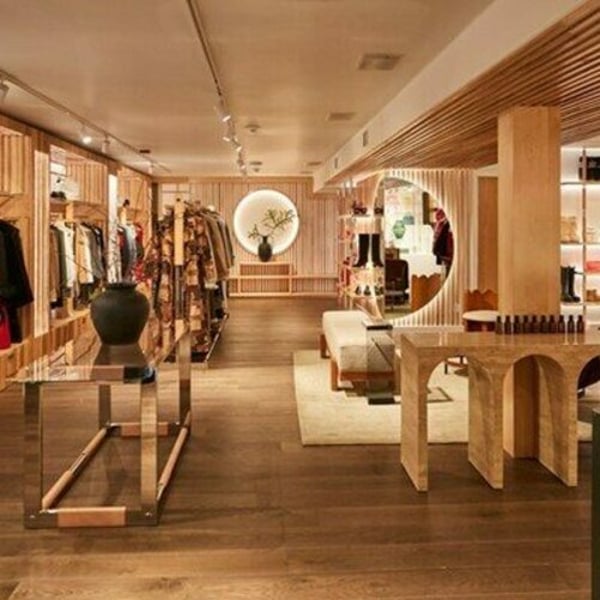By
Bloomberg
Published
Aug 2, 2024
Revolve Group Inc., a popular fashion hub among young influencer-obsessed shoppers during the pandemic, is seeing its shares tumble as sales dry up. So, in an attempt to juice the brand, the company is trying something it’s never done before — run an actual store.
The luxury-adjacent retailer uses a marketing strategy that’s largely about latching onto social media influencers with substantial followings and throwing glitzy parties that they can attend to create an aura of celebrity aspiration among customers. The whole process takes place online, something that had worked beautifully for Revolve, which carries more than 120 brands that are popular with Millennials and Generation Z, including Golden Goose, Free People and Steve Madden.
But retail trends are changing. Shoppers increasingly want to physically see and try on clothes, creating demand for old fashioned brick-and-mortar stores and forcing online brands to evolve or stagnate.
In response, Revolve launched a limited-time pop-up store in ritzy Aspen, Colorado, in December. In June, the company opened its first permanent physical location at that exact spot. The question now is: Where does it go from here?
“[Revolve has been] reticent to acknowledge the need for stores because they are such an online, tech-forward company,” Dylan Carden, an analyst at William Blair, said in an interview. “Now here they are saying they are going to do it. The risk is that they don’t do it wholeheartedly.”
The company’s issues are reflected in its market capitalization. Revolve’s valuation peaked in late 2021 during the Covid pandemic, but it has lost roughly 80% since then, plunging from $6.4 billion on Nov. 18, 2021, to $1.3 billion, as the shares tumbled from a high of $87.79 to around $19.
That said, Revolve remains a financially attractive business. It has lots of cash and its earnings projections are rising.
Pop-up success
What’s more, the Aspen pop-up store experiment was a success, Chief Financial Officer Jesse Timmerman said in an interview. Revolve chose the location because it fits with the retailer’s aspirational branding targeting 18- to 35-year-old women. The results exceeded expectations, making a permanent store logical, Timmerman said.
Now the company is looking at locations in luxury destinations like the Hamptons beach towns outside New York or Montecito near Santa Barbara, California. The company also could shoot for a flagship location in a wealthy urban area such as Manhattan or Beverly Hills.
However, investors shouldn’t expect Revolve to follow Aritzia Inc., a popular retail brand that started as a brick-and-mortar chain but turned to e-commerce. Its stock has held up better than Revolve’s, dropping around 33% from its January 2022 peak, and the company now has more than 100 stores around the world.
“That’s not our style,” Timmerman said. “When opportunities arise, we’ll take advantage.”
Wall Street isn’t totally sold on Revolve’s plans. Of the 19 analysts covering the company, only eight have buy ratings, whereas nine have holds and two have sells. Aritzia has nine analysts tracking it, with eight buy ratings and one hold.
Revolve’s issue is revenue growth, which started to show signs of life at the start of the second quarter, Barclays analyst Trevor Young wrote in a July 18 note. The company will report its second-quarter earnings on Aug. 6 after the market closes. Young has an underweight recommendation on the stock and a Street-low price target of $14.
The company’s biggest strength is a solid cash position that gives it the ability to pivot. For the past 20 years, retail has been about “bricks and clicks, and the integration of the physical and digital,” said TD Cowen analyst Oliver Chen, who has a buy rating on the stock. He said physical stores are a “natural progression” for the company.
Another positive is Revolve’s “data-driven product curation, expansion into men’s and beauty, along with an influencer-led and events-based social-media strategy,” Bloomberg Intelligence analyst Poonam Goyal wrote in a May 7 note.
Indeed, Revolve’s biggest strength may be influencer marketing. For example, the company hosts its own invite-only “Revolve Festival” at the annual Coachella music festival and holds attention-grabbing parties made for media publicity.
Social media mavens
The company has a knack for building awareness through social media, said Vanessa Flaherty, president of Digital Brand Architects. She said Revolve’s relationship with influencers is symbiotic: Revolve benefits from the influencers’ reach when they promote their clothes, and influencers gain access to the company’s six million Instagram followers and exclusive events.
For example, Revolve co-hosted a party at the 2022 Super Bowl in Los Angeles with Justin Bieber and Drake performing. It also holds iconic brand trips, where the company sends influencers to luxurious locations for promotions and visibility.
“We went to Turks and Caicos, which for me was the most exciting thing I’ve probably ever done in my career,” Ella Rose, digital creator and founder of Skin by Ella, said in an interview. A 27-year-old New Yorker who has over 230,000 followers on Instagram, Rose said Revolve was “the coolest brand I could think of to work with” when she was first starting out.
Rose described her job as “almost like an online friend that you have a connection to.” Her followers often send direct messages asking for advice like, “I’m going out on a date this Friday, do you think I should wear this?” she said.
All of which points to the retailer’s growth potential and has investors wondering if Revolve’s stock price has fallen to a “really attractive point,” said Jordan McNamee, founder of Optimist Fund, which owns Revolve shares.
In light of the company’s long-term upside, McNamee doesn’t believe Revolve necessarily needs physical stores to keep growing. However, he thinks they’ll be key to the company’s future.
“Revolve will be a big brick-and-mortar retailer over the next 10 to 20 years,” McNamee said. “That is something I’m absolutely certain of just because of the ambition of the two founders running the company.”







